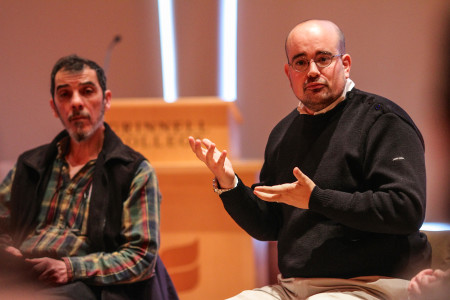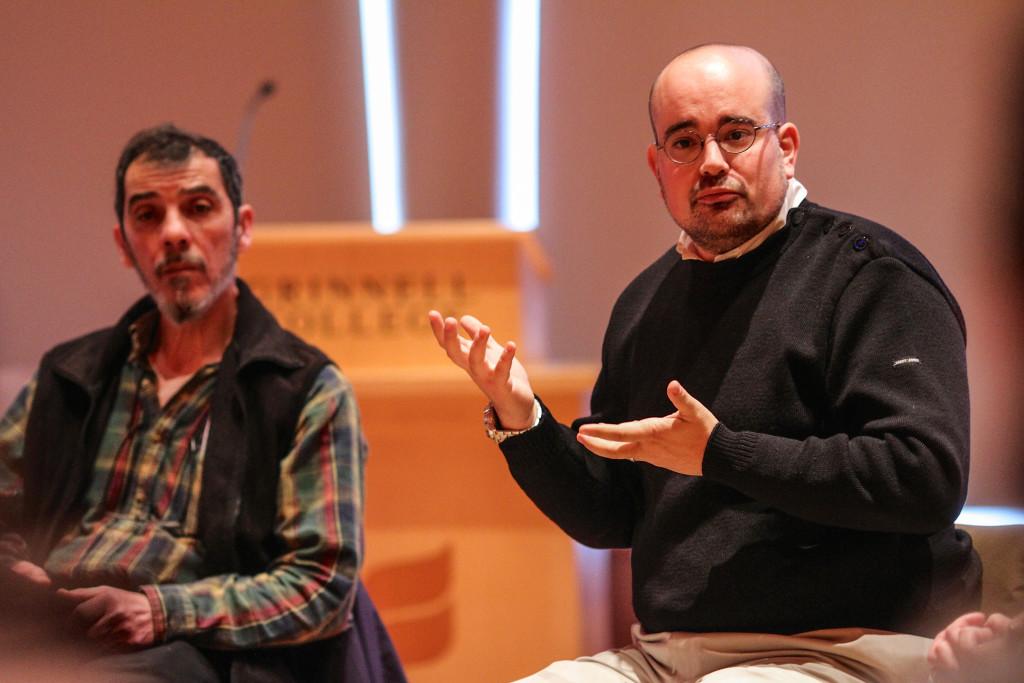On Wednesday afternoon, Feb. 18, scholars from both Grinnell College and abroad came together to discuss recent events in France, specifically the Charlie Hebdo massacre and similar incidents that have taken place in recent weeks. The discussion, which took place in JRC 101, was organized and moderated by Professor David Harrison, French, and featured speakers Professors Jan Gross, French, and Katya Gibel Mevorach, Anthropology, Kamal Hammouda, Adjunct Religious Life Leader and David Vauclair, a visiting scholar from Paris. Modelled primarily as a roundtable discussion, the event was designed to encourage questions and perspectives from attendees.
Harrison argued that the roundtable format was necessary to present the variety of perspectives associated with the recent events in France, adding that each and every viewpoint must be understood in order to fully grasp the situation.

Photo by Aaron Juarez.
“There are so many perspectives and contexts on this issue that no matter how many people present initial remarks, there are going to be other people in the audience who have important things to add,” Harrison said. “I wanted to create an event which communicated to everyone in the audience that they have something to contribute to this discussion. It’s not simply experts and non-experts.”
Vauclair, who spoke first, emphasized the significance of French identity and locality to Charlie Hebdo. He provided background on the history of caricature in France and dove into the specifics of Charlie Hebdo’s history and violent backlash to political expression in France during the last decade. Vauclair then contrasted the peaceful display of French solidarity with American ideas of identity, which often emphasize group identities above
one’s national identity.
“I think it’s always interesting to compare and contrast American society with French society,” Vauclair said. “They are based on really different understanding of what it means to live together, and what it means to accept a newcomer into one’s society, with the multicultural type of structure in the United States and the assimilationist one in France.”
Gross proceeded to reinforce the significance of solidarity in regards to these events as she addressed the subjects of cultural and historical experience in the reactions of various members of the French community, including her own connections with Muslim people living in France.
Hammouda also offered a Muslim perspective on the events, emphasizing that terrorism is separate from religion. He explained the difficulty of defining the line where freedom of expression goes too far and prompted the audience by stating that while certain images and statements are offensive, perhaps unnecessarily so, does this mean they should be censored? He concluded that expression should be free but responsible, and that every person’s inherent bias must be accepted if we are to deal with these issues.
Meanwhile, Gibel Mevorach turned away from specific discussion of the Charlie Hebdo incident to address events that subsequently occurred, such as the recent shooting in Copenhagen. She asserted that the French background is interesting but does not encapsulate the greater issues that have unfolded. Violence against freedom of expression is never excusable, Gibel Mevorach argued, instead emphasizing that freedom of expression is undermined whenever it followed by a “but,” and that freedom is indivisible.
She continued by addressing the necessity of all people’s understanding of these occurrences. Although Americans may not feel immediately affected by these events, they must be aware of them as members of a global community, and in order to evoke change, Gibel Mevorach stated.
“There are principle questions here,” she said. “They may not affect us immediately … but if you say, ‘I don’t want to hear anything that offends me,’ how can you live? If you say, ‘I don’t want to see anything that upsets me,’ how can you learn? If you say ‘I don’t want to hear the other side’s opinion, I don’t want to hear anything about them, they don’t interest me’—they don’t interest you today, but tomorrow when they’re in your backyard, they’ll interest you.”
During the discussion following the panel’s statement, audience members inquired about different issues concerning the freedom of religion, the separation of public and private spheres within society and the implications of these events for the Islamic community
Attendee Charlie Rosenblum ’18 added that he was particularly intrigued by the conversation begun bystaffers of the Charlie Hebdo magazine, especially in regards to the issue of satire and free speech.
“One aspect of the panel I found intriguing was the reaction of the Charlie Hebdo staff to the worldwide support of their magazine,” Rosenblum said. “Many of the staff didn’t want to become martyrs or symbols for the freedom of press and speech but to merely create a satirical magazine. As such, the staff criticized those who came out and spoke ‘Je Suis Charlie’ even though they were either not in favor of the magazine beforehand or had never read it before.”


































































